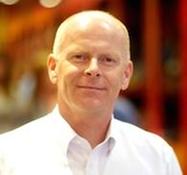
|
|
| Paul Currie | |
"I see ourselves really as a lifestyle retailer rather than a high street library," Paul Currie, CEO of Foyles, the famous London bookshop with six locations in England, said in a recent interview. "The days of bookshops being libraries on the high street or libraries in a mall are gone. Reading is now a lifestyle statement."
Before being appointed CEO of Foyles in April 2015, Currie was chief operating officer at Hamleys toy store and global v-p of retail sales and operations for cosmetics company Molton Brown.
"It's a very different animal, but it has the same principles," said Currie on the switch from toys and cosmetics to book retailing. "You buy something, you sell something. You make a margin. You invest that margin back into the business."
.jpg)
|
|
| Foyles' flagship store. | |
Foyles, once an old-school English bookshop, has made major changes over the past decade under previous CEO Sam Husain, who began modernizing the company and in 2014 led the move of the flagship Charing Cross Road location into a "bookshop of the future."
Under Currie, the company is making more strides--taking the bookshop of the future farther into the future, with initiatives that range from merging online and in-store operations and having staff use digital devices on the floor to managing operations costs and buying more efficiently. There's also a new emphasis on customer service that takes an unusual approach.
"[Customer service] was something we thought we did [well] but really, when you analyzed the situation, we weren't," explained Currie. Booksellers spent too much time behind the till, shelving and ordering--and not talking to customers, he said. "We were reversing into type, which was very task driven retail service--shelving, shelving, shelving. And we thought that was service."
He named Janette Cross, a long-time Foyles employee, head of customer experience, and Cross created a system for training all Foyles employees, booksellers and otherwise, in customer service. The system, called Project Barnum, divides bookstore customers into a few general categories, teaches booksellers how to spot them and what kind of service best suits each type of customer.
"There may be customers who come in and say [through body language] leave me alone until I'm ready," Currie offered as an example of one category of customer. "There will be the other type of customer, who is something like me, who needs help immediately.... And then there's another type of customer, our extremely loyal customer, who would live in this store if they had the chance."
In the past, Currie continued, Foyles booksellers may not have recognized these different sorts of customers and that they needed different types of service. Currie added that Barnum "helps us deliver a greater, more bespoke tailored service to our customers, and therefore engage more customers."
Another of Currie's major, early initiatives was overhauling Foyles' online operations. Before his arrival, Currie said, Foyles was "quite a siloed operation," with the company's Internet and e-commerce business effectively at odds with its core in-store business. The online store discounted deeply, had different price structures than the physical stores and a separate marketing strategy. Currie recalled that customers would ask booksellers why they were selling the same books online for 40% or even 50% less than in stores. "Basically they were saying, are you ripping me off?"
The Internet business was losing a lot of money, and to correct that, Currie "harmonized" in-store and online prices and integrated online and physical marketing as well as online and physical buying. With everything now under one roof, Currie said, in-store teams now feel comfortable referring customers to the Foyles e-commerce site if a specific book is not in store. Looking ahead, Currie said he believes that the future of Foyles is to share its e-commerce platform across all parts of the business.
"We work holistically as one business now, but multi-channel," said Currie. "That has plugged a massive loss in our internet business, brought all of our trading divisions together, and removed the confusion the customers had."
 |
|
| The newest Foyles, in Birmingham. | |
The newest Foyles opened in Birmingham, England's second-largest city, last September. It is a 4,000-square-foot store, in Birmingham's central train station. This new branch, Currie explained, marks a "new chapter" in the company's business, one that fuses Foyles' physical and digital operations.
"I said, let's use this as a model store," recalled Currie. "Let's distill all of our ideas into one place."
Project Barnum was invented in Birmingham and first employed there for both recruitment and staff training. The store is peppered with video screens, on which customers can watch a plethora of video content developed by publishers to complement the physical books. Also created and implemented at the Birmingham store was the path system, in which every bookseller is equipped with a digital device that can be used to search that store's inventory as well as the entire Foyles database, and carry out transactions.
By July of this year, Foyles will roll out the path system and digital devices into its other stores, and has already begun integrating video screens and Barnum training. Currie intends also to refocus on social media, relaunch the Foyles newsletter as more of a digital magazine and revamp the loyalty program. And later this year Foyles will open another location, in Chelmsford, a city of about 110,000 people some 30 miles northeast of London.
Despite his plans to integrate digital and physical operations and his belief that this is the future of Foyles, Currie is adamant that he has no intention of taking people off the sales floor, of using technology to de-staff.
"It goes across all of our channels: we are investing in people," said Currie. --Alex Mutter

